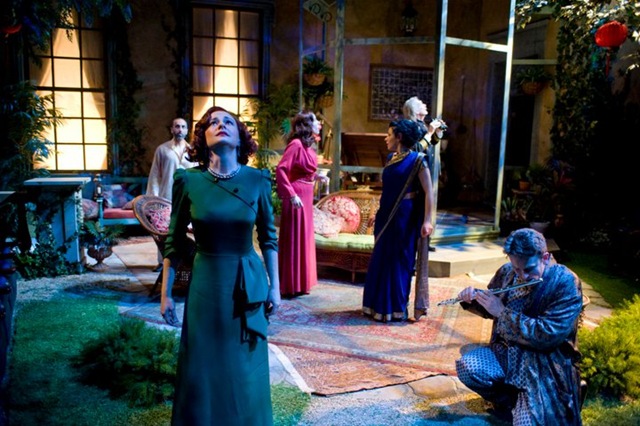My mother turned eighty-two today. She didn’t expect to spend her birthday in a hospital room, any more than Mrs. T and I expected to spend it sitting by her bed. As usual, I had to plug our annual summertime visit to Smalltown, U.S.A., into the only available hole in my schedule, and the hole in question closed up last Thursday. Our plan was to send flowers from the road. Instead we delivered them in person, which is–needless to say–much nicer.
Now that my mother is feeling better, I can say that her ailment (a perforated bowel) was sufficiently grave that she wasn’t expected to live. That she not only survived a major operation but now appears to be flourishing is a sign of the stamina of a woman who was born in the same year that the Great Depression began working its terrible will on America. Life was tough in the Thirties, especially if, like my mother, you grew up on a dirt farm in the middle of nowhere. Anyone who got through the Thirties in one piece isn’t likely to be fazed by a perforated bowel, or anything else.
Not surprisingly, Stephen Sondheim wrote a song about it:
I’ve run the gamut
A to Z.
Three cheers and dammit,
C’est la vie.
I got through all of last year,
And I’m here.
She sure is, for which all of the Teachouts are profoundly grateful today.
* * *
Yvonne De Carlo sings “I’m Still Here” on The David Frost Show:

 Life has been hectic since Mrs. T and I rushed my mother to the hospital last Wednesday for emergency surgery. We’d been planning to drive up to St. Louis on Thursday to see a show, which of course we didn’t do, and we expected for the same reason not to return to New York on Friday afternoon. But my mother, like so many veterans of the Great Depression, is much tougher than she looks, and it soon became evident that she was going to fool everybody and get better.
Life has been hectic since Mrs. T and I rushed my mother to the hospital last Wednesday for emergency surgery. We’d been planning to drive up to St. Louis on Thursday to see a show, which of course we didn’t do, and we expected for the same reason not to return to New York on Friday afternoon. But my mother, like so many veterans of the Great Depression, is much tougher than she looks, and it soon became evident that she was going to fool everybody and get better. It sounds plausible when put so elegantly, but at bottom Tynan is saying that criticism is pure opinion, and he went well out of his way to practice what he preached. He was, as a result, a wildly erratic critic, sometimes inspirational but at least as often arbitrary to the point of perversity, and it was his invariable custom to offer up his prejudices as though they were the revealed word. Thus it isn’t surprising that he was a power-seeker who longed desperately to work on the other side of the proscenium–indeed, Tynan abandoned criticism early on to become the first literary manager of the National Theatre under Laurence Olivier–and it’s downright funny to learn that the sharpest-tongued critic of his day was in private life a devotee of S&M who liked to spank his sex partners.
It sounds plausible when put so elegantly, but at bottom Tynan is saying that criticism is pure opinion, and he went well out of his way to practice what he preached. He was, as a result, a wildly erratic critic, sometimes inspirational but at least as often arbitrary to the point of perversity, and it was his invariable custom to offer up his prejudices as though they were the revealed word. Thus it isn’t surprising that he was a power-seeker who longed desperately to work on the other side of the proscenium–indeed, Tynan abandoned criticism early on to become the first literary manager of the National Theatre under Laurence Olivier–and it’s downright funny to learn that the sharpest-tongued critic of his day was in private life a devotee of S&M who liked to spank his sex partners. The other day I took my mother for a drive through the flood-drenched lowlands of Illinois, east of the Mississippi River. It’s been years since I saw that part of the country under water, and the sight was alarming–as well as sobering.
The other day I took my mother for a drive through the flood-drenched lowlands of Illinois, east of the Mississippi River. It’s been years since I saw that part of the country under water, and the sight was alarming–as well as sobering. I’m not a fatalist, much less a quietist. Cardinal Newman summed up my view of things in The Dream of Gerontius: And, ere afresh the ruin on thee fall,/Use well the interval. The fact that we all live under the aspect of eternity has always struck me not as a reason for passivity but as a goad to action. That said, it was no less instructive that Mrs. T and I had to rush my mother to a hospital in Cape Girardeau for emergency surgery not two days after our visit to the floodlands.
I’m not a fatalist, much less a quietist. Cardinal Newman summed up my view of things in The Dream of Gerontius: And, ere afresh the ruin on thee fall,/Use well the interval. The fact that we all live under the aspect of eternity has always struck me not as a reason for passivity but as a goad to action. That said, it was no less instructive that Mrs. T and I had to rush my mother to a hospital in Cape Girardeau for emergency surgery not two days after our visit to the floodlands. Now that “Heartbreak House” is in the public domain, it can be performed with cuts, and Mr. Brown has tightened the script so shrewdly that you’ll have to look at the published version to see what got left out of his staging, which runs for about two hours and 45 minutes. He has also moved the action forward from 1914 to 1940 in order to give the play a more contemporary feel. It’s a clever touch, though my guess is that both of the world wars will seem equally alien to most of those who see this revival. Far more important is the skill with which Mr. Brown has balanced the play’s predominantly comic aspect with the sharp shock of the final scene, in which sirens wail and bombs descend on the country garden of the Shotovers, who respond with a horrific glee that symbolizes the death wish of their doomed class.
Now that “Heartbreak House” is in the public domain, it can be performed with cuts, and Mr. Brown has tightened the script so shrewdly that you’ll have to look at the published version to see what got left out of his staging, which runs for about two hours and 45 minutes. He has also moved the action forward from 1914 to 1940 in order to give the play a more contemporary feel. It’s a clever touch, though my guess is that both of the world wars will seem equally alien to most of those who see this revival. Far more important is the skill with which Mr. Brown has balanced the play’s predominantly comic aspect with the sharp shock of the final scene, in which sirens wail and bombs descend on the country garden of the Shotovers, who respond with a horrific glee that symbolizes the death wish of their doomed class.